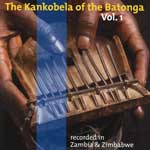The Tonga people (Batonga) live on either side of Lake Kariba, some to the south in Zimbabwe, most to the north in Zambia. The Batonga kankobela is a cousin of the better known and physically larger Shona mbira of Zimbabwe. The kankobela varies widely in both construction and tuning. It can use anywhere from 8-15 keys and may or may not be constructed using spiders’ egg sacks to create a buzzing that is in some cases louder than the actual note. These and other characteristics affecting the music are matters of personal taste in the highly individualistic world of kankobela.
Field recordist Michael Baird has documented 19 kankobela players in both Zambia and Zimbabwe, some in 1996 and others in 2008. This is the first of two planned CD volumes, and it offers a rich introduction into a hidden world of African traditional music. The seven players here (all recorded in 2008) emerge both as artists and individuals. There’s the craggy, playful voice Andrew George Munymbwe of Halubilo Village in Zambia, who plays with a lot of buzz on his instrument, also an easy cadence on “Saliya Ndakuleka (I’m Breaking up with Sally).” Then there’s the lighter, clearer tone and gentle vocal of Zambia’s Aaron Nichenje. Benson Siamundyoli, also from Zambia, produces a deep groove and warbling buzz tones on “Njokolai (Where Am I Going to Stay?),” a warning about witchcraft in which his mumbled vocal remains within a narrow melodic range. Elsewhere, rhythms stretch and meander, as in Munymbwe’s mysterious and elemental “Twafa Nzala (We Are Hungry),” which seems to defy rhythmic analysis.
Behind this beguiling music lies a sad story. The creation of the Lake Kariba by the British between 1958-63 triggered a shocking saga of cultural erasure. Culture and identity are often deeply tied to land in this part of Africa, so by flooding out ancestral lands and forcing people onto barren land to the south and north, the British devastated far more than property. The music here is a threatened, but still surviving remnant of that tragedy. In documenting it so carefully, Baird carries on the tradition of great field recordists of the past, including Hugh Tracey, whose work Baird has curated in an invaluable 22-CD series on Sharp Wood. But this CD is more than a gift to African music scholarship and preservation. It is filled with some of the funkiest, hippest sounds you’ll find on any CD out this year. Can’t wait for the remixes!
-Banning Eyre









